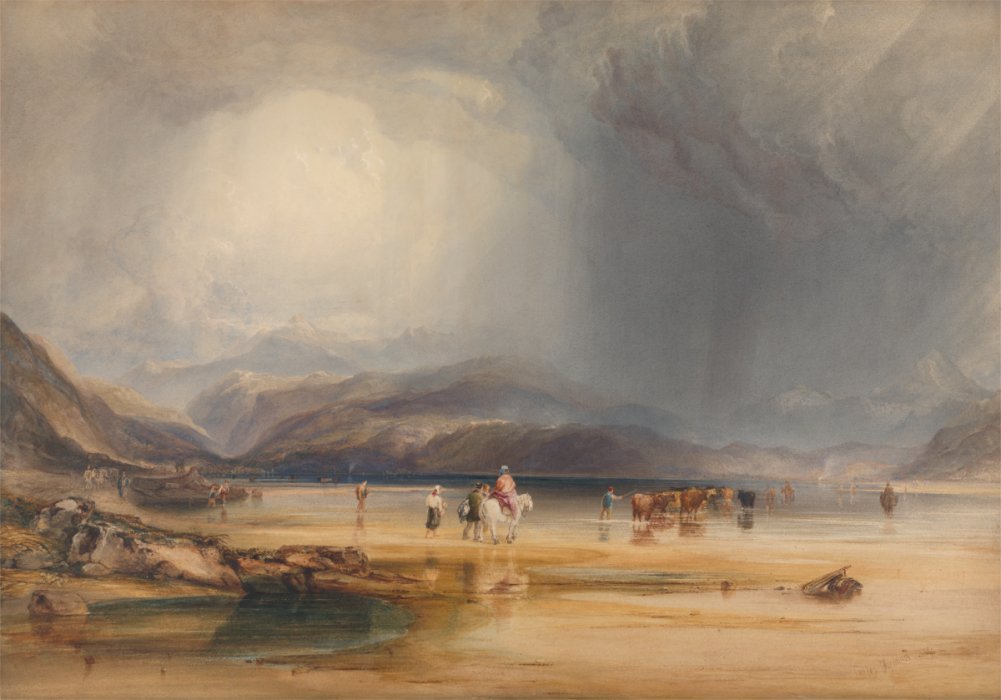
The Sands of Dee is a poem within a novel, Alton Locke, written by Charles Kingsley in 1849. Like most great rock and roll, he pens the lines to impress a girl, to give words to an air she’s played on the piano. An air without words.
What is an air? To the Irish, an air is a song played on an instrument, wordlessly. As opposed to a tune, which is a melody never intended to carry words, usually for dancing.
Danny Boy, that crusty old piece of cheese, was once a truly heart felt sentiment before it fell into cliche. But it was written to fit an air called the Londonderry Air, among other things. The original words were long lost, likely because the tune was so beautiful that the words became superflous.
The young lady in question plays to the narrator an air which moves him deeply. It helps that she makes his heart, among other body parts, throb. He pledges to put words to the tune at her request.
“Perhaps,” I said, humbly, “that is the only way to write songs–to let some air get possession of ones whole soul, and gradually inspire the words for itself; as the old Hebrew prophets had music played before them, to wake up the prophetic spirit within them.”
As it happened, my attention was caught by hearing two gentlemen close to me discuss a beautiful sketch by Copley Fielding, if I recollect rightly, which hung on the wall–a wild waste of tidal sands, with here and there a line of stake-nets fluttering in the wind–a grey shroud of rain sweeping up from the westward, through which low red cliffs glowed dimly in the rays of the setting sun–a train of horses and cattle splashing slowly through shallow desolate pools and creeks, their wet, red, and black hides glittering in one long line of level light.
They seemed thoroughly conversant with art; and as I listened to their criticisms, I learnt more in five minutes about the characteristics of a really true and good picture, and about the perfection to which our unrivalled English landscape-painters have attained, than I ever did from all the books and criticisms which I had read. One of them had seen the spot represented, at the mouth of the Dee, and began telling wild stories of salmon-fishing, and wildfowl shooting–and then a tale of a girl, who, in bringing her father’s cattle home across the sands, had been caught by a sudden flow of the tide, and found next day a corpse hanging among the stake-nets far below. The tragedy, the art of the picture, the simple, dreary grandeur of the scenery, took possession of me; and I stood gazing a long time, and fancying myself pacing the sands, and wondering whether there were shells upon it–I had often longed for once only in my life to pick up shells–when Lady Ellerton, whom I had not before noticed, woke me from my reverie.
From Alton Locke
Today, the Dee estuary, close to Parkgate is silted up, the docks empty.
Mary’s story is based on truth.
When the book was written, cattle were grazed along the estuary, which was essentially marshland. Mary was sent to bring the cattle back before the tide came in. She tarried, and the sands which she walked along were swallowed up by the sea, taking her as well.
According to legend, on misty evenings, people could still hear her calling the cattle, and the cattle calling out in reply. And then silence.
The Sands of Dee (from Alton Locke)
By Charles Kingsley (1819–1875)
‘O MARY, go and call the cattle home,
And call the cattle home,
And call the cattle home,
Across the sands o’ Dee;’
The western wind was wild and dank wi’ foam,
And all alone went she.
The creeping tide came up along the sand,
And o’er and o’er the sand,
And round and round the sand,
As far as eye could see;
The blinding mist came down and hid the land—
And never home came she.
‘Oh, is it weed, or fish, or floating hair—
A tress o’ golden hair,
O’ drownèd maiden’s hair,
Above the nets at sea?
Was never salmon yet that shone so fair,
Among the stakes on Dee.’
They rowed her in across the rolling foam,
The cruel, crawling foam,
The cruel, hungry foam,
To her grave beside the sea;
But still the boatmen hear her call the cattle home,
Across the sands o’ Dee.

